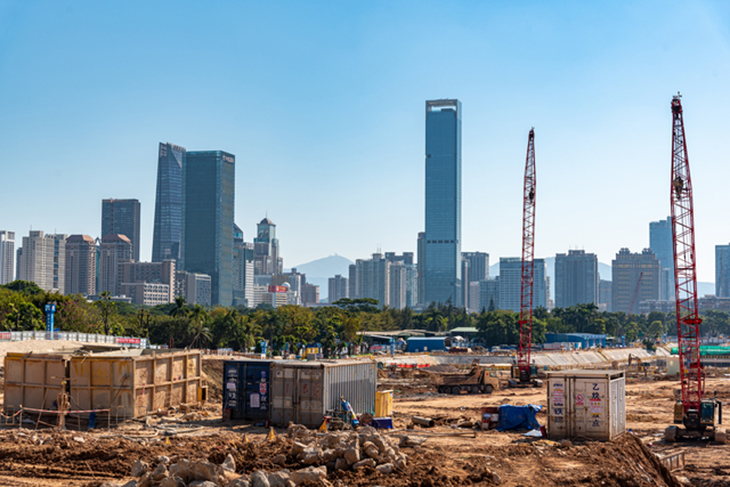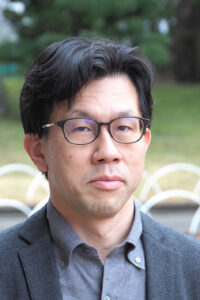Macroeconomic Policies in Japan and China amid Prolonged Stagnation

“The lowering of the growth rate due to the country’s “zero corona” policy has brought about a major shift in the long-standing trend of growth rates exceeding interest rates in China.” Photo shows real estate development in a city in southern China.
Photo: Captain Hook/PIXTA
KAJITANI Kai, Professor, Graduate School of Economics, Kobe University

Prof. Kajitani Kai
A specialized book has attracted a great deal of attention online in Japan since its publication in the United States. That book is Fiscal Policy Under Low Interest Rates by macroeconomist Olivier Blanchard, an eminent professor at the Massachusetts Institute of Technology.
As its title suggests, the author claims that, with interest rates, or “safe interest rates” such as yields on government bonds, remaining at a very low level, sometimes below the growth rate, governments should underpin demand in economies experiencing a prolonged period of stagnation where real interest rates have fallen below their effective lower bound (ELB) by increasing the issuance of public debt and implementing aggressive fiscal policy.
One reason why Blanchard’s book has generated so much interest in Japan is its positive evaluation of Abenomics, an approach exemplified by its bold monetary easing policy led by the Bank of Japan (BoJ) Governor Kuroda Haruhiko. During this time, Japan’s public debt ratio increased and total debt surpassed 250% of GDP. However, Blanchard argues that an expansion in the deficit was necessary in order to compensate for very weak private demand. He also applauds the fact that sustained monetary easing under BoJ Governor Kuroda bolstered fiscal sustainability through the maintenance of low long-term safe interest rates.
Blanchard discusses the macroeconomic policies of the EU and the US, noting that many other major countries besides Japan are experiencing prolonged stagnation. On the other hand, his book does not specifically mention is made of China and other emerging economies. However, the author believes that the case of the Chinese economy in fact fits very well with Blanchard’s argument in a way that is distinct from that of the Japanese economy. This is because since 2008, China’s growth rate has consistently exceeded the country’s average lending rate, which can be understood in terms of what Blanchard refers to as the “low interest rate economy = prolonged stagnation.”
On the other hand, China has maintained a much higher growth rate than Japan and has not seen an expansion of public debt that exceeds GDP. This may explain the emergence of the so-called “rational bubble,” persistent increase in the price of real estate over the long term, which is one of the important consequences of a “low interest rate economy.”
The mechanism at play when the rational bubble occurs is frequently explained through a so-called overlapping generations model. This model assumes that each person lives for two periods: “young” in the first period of their life and “old” in the second. In other words, people consume a portion of their income acquired via employment during the young period, then during the old period, they live off the savings that they accumulated during the young period. Consider now a scenario in which the economy is in prolonged stagnation and the rate of return on capital is low, and as a result the interest rate is below the economy’s growth rate. In such a scenario, in the absence of alternative means of creating assets, people have no choice but to save with low interest rates and settle for low levels of consumption during the old period.
According to Professor Jean Tirole of the École des hautes études en sciences sociales (EHESS), even in such a scenario, the consumption levels of all generations can in fact be increased by improving the efficiency of resource allocation in the economy as a whole, through the repeated intergenerational purchase and disposal of assets that rise in value along with economic growth – typically real estate assets. In this scenario, assets that ought ordinarily to have no fundamental value are traded as having a certain value and that value increases over time, thereby generating a “bubble.” In short, a low interest rate economy and the emergence of a rational bubble are two sides of the same coin.
This scenario accords with the current situation in China, where the desire for security in retirement is commonly cited as the motivation for the purchase of condominiums. For example, many relatively affluent families living in urban environments purchase second condominiums for their sons to reside in after marriage, a practice believed to be driven by an expectation that their sons and daughters-in-law will support them in their old age.
However, the lowering of the growth rate due to the country’s “zero corona” policy has brought about a major shift in the long-standing trend of growth rates exceeding interest rates in China. The protracted cooling of the real estate market that followed the credit squeeze in the summer of 2020 led to a run of problems including the suspension of new condominium construction work and defaults on loan payments, a situation that likely reflects this shift in macroeconomic conditions. These macroeconomic changes mean that a “rational bubble” in the sense of a persistent increase in the prices of real estate over the long term is no longer sustainable.
Of course, in contrast to Japan, which continues a zero interest rate policy, China still has some leeway to reduce interest rates. However, if major countries continue to adopt high interest rate policies to combat inflation, there will be a limit to how far interest rates can be reduced, which may result in exchange rate depreciation.
The rational bubble is generally hard to burst, but once it does, the repercussions will be massive. The Chinese economy has long relied on the transfer of resources from one generation to the next via the “rational bubble” of the real estate market in order to control the financial deficit while securing a comfortable life for retirees. If the foundations of this structure collapse, society will be greatly destabilized without a doubt.
To overcome this challenging situation, government authorities must maintain the current economic growth rate, prevent a sharp decline in the exchange rate, and keep the low interest rate policy in place. In the meantime, they need to expand and improve the social security system in order to prepare for an accelerating aging society, and solve the further difficult issue, determining how to apportion the rapidly increasing public expenditure between the central and local governments.
The above will require maneuvers bordering on the acrobatic. Given that Xi Jinping has crushed dissent within his administration by surrounding himself with only his relatives and yes-men, the question is whether this will be possible during his third term of office. The economic outlook for China does not offer grounds for optimism.
Translated from an original article in Japanese written for Discuss Japan. [March 2023]
Keywords
- Kajitani Kai
- Graduate School of Economics
- Kobe University
- Olivier Blanchard
- low interest rate
- prolonged stagnation
- public debt
- Bank of Japan
- Abenomics
- China
- rational bubble
- overlapping generations
- real estate
- Jean Tirole
- savings
- consumption
- economic outlook




